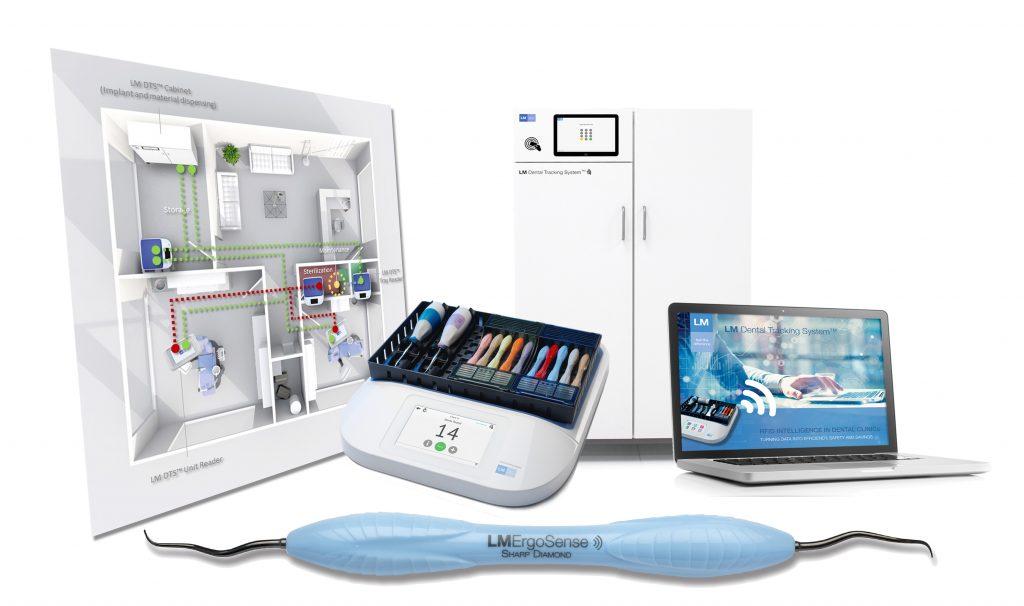
Here to guide you with answers to all your questions.
Frequently Asked Questions
Product-related
No. LM™ have integrated RFID chips that are guaranteed to work with LM DTS™. However, LM™ offers you the possibility to retrotag your current instruments other non-LM™ assets to make them compatible with LM DTS™. You can conveniently get retrotag kits and materials from your LM-Dental dealer. Other assets, like materials and consumables you can tag with LM DTS™ stickers. Or if you prefer, you can create your own retrotag solution or contact 3rd party sticker providers and use them with LM DTS™.
Not necessarily, but you can only track instruments that have been tagged. An alternative could be to tag your cassettes first.
Another possibility is to use a barcode solution as a barcode reader can be connected to the LM DTS™ Table Reader, but these are rarely unique, which means that you can only track i.e. instrument type, not the individual instruments.
Retrotagging
Please contact your nearest LM-Dental™ dealer and explain your needs. They will provide all materials you need for retrotagging. You will also receive training and training material to get started. Our dealers can also help you with the planning of the work and advise you what is the best time to apply it when you know all the parameters.
Typically, tagging is done by the end customer itself after training from LM- Dental™ dealer.
You can do the retrotagging yourself if you are willing to invest some working time for the tagging. LM™ dealers will help you plan the work ahead once they know all parameters.
Yes. Our LM DTS™ customers have been using the system and tagged instrument since 2015.
Retrotags are designed to last over 2000 cycles of sterilization and most likely the tag will be come off in the autoclave if at all or the RFID chip will malfunction before the tag will come off. Typically tagged assets break or become unusable before tags.
LM-Dental™ has also made several internal durability tests for the tags. Please, see the biocompatibility, endurability and sterilizability report.
Even though our retrotagging products are NOT modifying the instruments intended use, it is the end-user’s responsibility to be aware of the regulation. The end-user is entitled to install RFID tags to dental instruments manufactured by a Third Party. When installing the RFID tags to dental instruments manufactured by a Third Party, the end-user is liable to check warranty terms and product information of the dental instruments to ensure that installation does not have an adverse effect on the dental instruments or to the terms and conditions applied between the end-user and its suppliers.
LM-ErgoSense hand instruments are the only products on the market with integrated RFID tags that are guaranteed to work with LM DTS™. All LM-ErgoSense™ hand instruments are also pre-defined in the LM DTS™ system so you never need to introduce them to the system, you can just start using them with LM DTS™ Reader. LM DTS™ instruments come with lifetime RFID chip warranty
Yes. They are specially designed for hundreds of sterilization cycles. Please, see the biocompatibility, endurability and sterilizability report
Yes. They are specially designed to be cleaned easily. As the 3rd party sterilization study shows, even normal ultrasonic cleaning sufficiently cleans the tags. Typically, in the sterilization process, this step is even followed or replaced by washer and autoclave cleaning procedure. Please, see the biocompatibility, endurability and sterilizability report.
In theory, yes, but in practice this would require excessive power applied to the tag which is impossible during normal treatment sessions.
Tags are designed to withstand over 2000 cycles of sterilization and most likely the tag will come off in the autoclave if at all or the RFID chip will end-of-life before the tag will come off.
Connectivity related
There are two methods to link LM DTS™ data to patient information. The first feature is called Encounter policy and the other is normal REST API (Application Programming Interface). You can use encounter ID (like patient ID) to track activities and articles (ex. instrument) based on each treatment. Encounter ID is now a link between LM DTS™ and patient database which you can later use to link your data.
Through the API you can fetch or import data from the LM DTS™ database. You can fetch data from LM DTS™ i.e. with certain encounter ID and show that in patient software or in 3rd party reporting tool.
LM DTS™ does not contain any patient data. LM DTS™ only saves asset related data, like chip information and what activities were performed where and when. As LM DTS™ is a closed system, it also saves user information, like First and Lastname. These are also visible when current user is logged in. However, you are not forced to use human understandable usernames, you can instead use identification cards + personal ID number for login and keep user information stored in your ERP system.
Other systems can fetch and push data to and from LM DTS™ via the REST API (Application Programming Interface), the idea being the same as with the connection to the patient database. Other system connections can also be 3rd party reporting engines.
Use and training related
- You can use LM DTS™ to analyze your system further.
- Is your instrument set size correct? Many times, some instruments are not used at all but they are part of the treatment set.
- Are you sharpening instruments too often, does it actually mean that your staff needs more training or should you switch to sharpen free products and eliminate this problem.
- Do you seem to lose instruments in centralized reprocessing?
- Do you seem to lose instruments or high valuable assets?
- Have you encountered a recall due to dirty instruments or have you had a close call?
- Are you manually logging maintenance actions or trying to save instrument usage history?
- Are you unclear how much time you are actually using instruments during certain treatments?
- Would you like to gather more instrument usage time over treatment to fully optimize your patient visit times per day?
- Are you purchasing your assets based on feeling or what you used to order previously? With LM DTS™ you can use facts to plan your purchase.
Please, see the benefits page for more information
Using of LM DTS™ system is very easy through user friendly readers and basic configuration is always done by LM™ or LM™ dealer experts or is pre-configured (LM DTS™ Entry Edition). Learning all secrets and applying data analysis will take longer, even years, but at the same time your value for the system will increase as you see the data working for you.
A typical installation takes one day. This depends heavily on the site readiness level and amount of LM DTS™ Readers to be installed when installation/training personnel arrive on site. One day’s installation assumes that there are no major technical issues with electricity or internet access for the Readers.
Training of clinicians takes one day. Before noon activities can be used for training and during the afternoon hours for follow-up training.
As an example: total of three days installation + training + retrotagging event would approximately contain 10-20 table readers, 5 people and 200 handpieces to tag.
LM DTS™ Cabinet installation on the same event would decrease the amount of the LM DTS™ Table Readers to installed.
No, on the contrary it will decrease the work as the system will alert you if any assets that are part of the LM DTS™ system are not going according your clinic workflow. In addition, you don’t need to manually check your inventory levels at each location.
Please, see the benefits page for more information
Data being relevant is always relative to customer expectations and what they wish to see from it. However, if you are looking for a system to see how many cycles instruments were used before end-of-life for how many instruments were sterilized in vain because of wrongly defined instrument set, you probably are looking at the right system. Analyzing of the data can be done directly from the LM DTS™ Server software by using the default reports and data log views. LM-Dental™ is constantly developing new and better reports and tools to analyze data but sometimes the best way for data analysis is to use the REST API (Application Programming Interface) and build your own reports. LM-Dental™ is also developing support for 3rd party reporting tools like PowerBI.
Cost, savings and investment related
LM-ErgoSense hand instruments with integrated RFID chip are few dollars more expensive than normal instruments. This is purely the cost of embedding the RFID chip inside the instrument. Read more about LM-ErgoSense hand instruments ..
With retrotagged instruments the price is slightly higher than with original LM-ErgoSense instruments as retrotagging solution contains multiple parts (glue, silicone cover, RFID chip and labour). LM DTS™ RFID stickers for retrotagging are few dollars each or available from 3rd party providers also (must be LM DTS™ compliant).
However, what you spend more on instruments you will save on….
This depends heavily on your system and to what purpose you are using LM DTS™.
If you are trying to prevent theft, LM DTS™ will basically reduce the loss of instruments or implants or any other asset you are tracking.
If you are trying to optimize your instrument sets or inventory levels, LM DTS™ will help your mission to save money.
If you are trying to avoid recall, due dirty instrument being used in a treatment or tracking down patient being at risk due other types of recalls.
Also have a look at our profit calculator
The return on investment is depending on what is the value for your clinic being LM DTS™ certified, what is its value to your customer? It is the only system on the market that will help your clinic personnel follow your defined sterilization workflow. Will it bring you more high profile workers as they are interested about LM DTS™ or are even used to use it at an institution already? Will your school be more attractive as it has LM DTS™ in use showing the school is technology orientated and believes in the complete workflow of digital dentistry?
Also have a look at our profit calculator
All you need to know about
LM Dental Tracking System™
We have gathered all frequently asked questions about LM Dental Tracking System™ on this page. In case there’s something else you’d like to know about LM DTS™, please contact us directly for further help!

Start your journey. Go beyond digital dentistry.
The determination of the customer-specific LM Dental Tracking System™ solution starts with core need identification: What is the current situation and what are the problem(s) and target(s) at the clinic.
Learn more about our solution how our smart entry editions and customized integrations.
